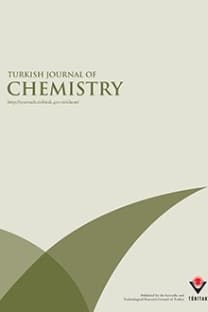Amino-functionalized mesostructured cellular foam silica: a highly efficient and recyclable catalyst in the Knoevenagel condensation reaction
Mesostructured cellular foam silica was functionalized by an amino group (MCF-NH$_{2})$ using the postsynthesis grafting method and utilized as a recyclable catalyst for the Knoevenagel reaction to afford $\alpha $, $\beta $-unsaturated compounds. The catalyst was systematically characterized by various analyses such as nitrogen adsorption, X-ray diffraction, Fourier transform infrared spectrophotometry, scanning electron microscopy, transmission electron microscopy, thermogravimetric analysis, and Hammett indicator method. The results showed that MCF-NH$_{2}$ catalyst was successfully prepared with a high surface area of 215 m$^{2}$ g$^{-1}$ and a large pore volume of 1.37 cm$^{3}$ g$^{-1}$. Compared with the nonfunctionalized MCF sample, the window and cell sizes of MCF-NH$_{2}$ decreased after amino group modification, whose NH$_{2}$-loading density was 1.56 mmol g$^{-1}$. The optimal condition was investigated and the highest catalytic activity was obtained in the presence of 0.1 g of MCF-NH$_{2}$ catalyst under ultrasound irradiation at room temperature in the mixed solvent of ethanol and water with a volume ratio of 3:1. Various aromatic aldehydes and active methylene compounds were converted to their desired products with excellent yields within a short time. Moreover, MCF-NH$_{2}$ catalyst showed high recyclability, being used four times without any significant decrease in activity.
Keywords:
Mesostructured cellular foam silica amino group, functionalization, recyclability, catalysis,
- ISSN: 1300-0527
- Yayın Aralığı: Yılda 6 Sayı
- Yayıncı: TÜBİTAK
Sayıdaki Diğer Makaleler
Osman AYDIN, Şule KÖKTEN, Hakan ÜNVER, İlhami ÇELİK
İulia Gabriela DAVID, Lorelei IORDACHE, Dana Elena POPA, Mihaela BULEANDRA, Victor DAVID, Emilia-elena IORGULESCU
Luka MATOVIC, Nikola TASIC, Nemanja TRISOVIC, Jelena LADAREVIC, Vesna VITNIK, Zeljko VITNIK, Branimir GRGUR, Dusan MIJIN
Dong HAO, Hongyuan YANG, Tengfei ZHANG, Qing LIU
Ayça Küçükakdağ DOĞU, Özgül Persil ÇETİNKOL
Osman AYDIN, Şule KÖKTEN, İlhami ÇELİK, Hakan ÜNVER
Ömer IŞILDAK, Nihal DELİGÖNÜL, Oğuz ÖZBEK
